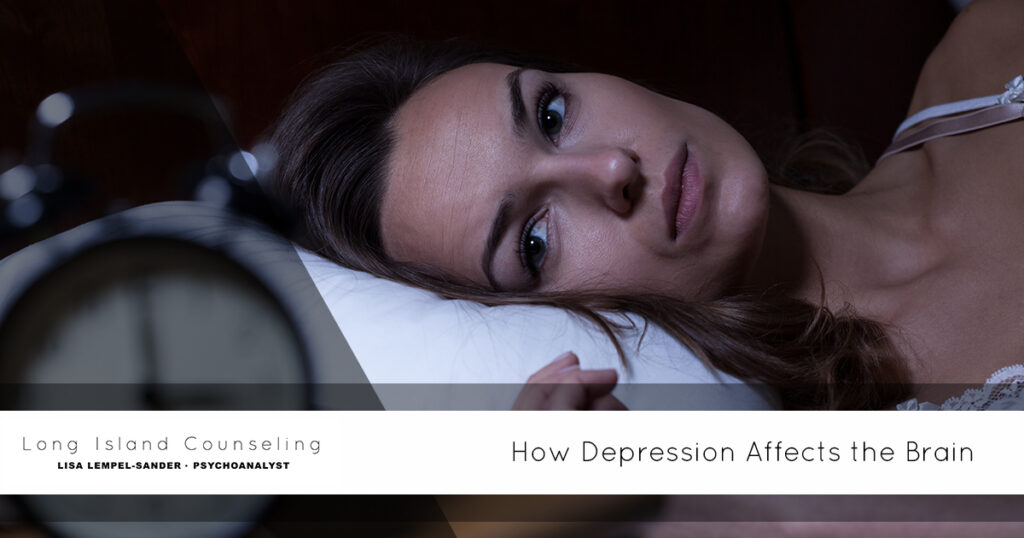How Depression Affects the Brain


Depression is a serious mental disorder that affects millions of individuals around the world. In fact, according to the World Health Organization, “more than 300 million people of all ages suffer from depression.” Even worse, nearly 800,000 people die each year by suicide which can be linked to depression and mental illness. Understanding the science behind how depression affects the human brain is key to begin treating the cause of depressive symptoms. That’s why, during today’s blog, we will outline some of the common symptoms associated with depression, while talking more about how those experiencing depression can seek help from qualified professionals.
At Long Island Counseling, we are the leading counseling practice specializing in family therapy, couples counseling, couples therapy, marriage counseling, and a variety of other counseling specialties. If you are located in Long Island, Nassau County, or Queens County, and are looking for a highly qualified psychotherapist that offers a variety of therapy services, contact Long Island Counseling today.
How Does Depression Affect Individuals?
Those suffering from MDD, or major depressive disorder, often experience increased levels of cortisol, or the hormone that is released during mental or physical stress. Because of this, many individuals experiencing depression may also experience memory problems. After experiencing chronic cortisol production, the hippocampus will begin to atrophy, which will usually lead to a decrease in emotions felt. The symptoms of depression are quite extensive and can be long lasting for many. Let’s take a look at some of the most common symptoms associated with depression.
Depression Symptoms
- Anxiety
- Irritability
- Restless Sleep
- Fatigue
- Appetite Loss
- Fluctuation in Weight
- Negative Thought Loops
- Loss of Interest in Activities
- Insomnia
- Suicidal Thoughts
- Recurring Sense of Guilt or Hopelessness
How To Get Help
If you have been feeling less than excited to participate in your favorite activities, feel like your emotions have been dulled over time, or have been experiencing suicidal thoughts, you should consider seeking help immediately from a qualified professional that specializes in recognizing and treating depressive symptoms. A licensed professional will be able to walk you through what you are experiencing while also helping to make you feel comfortable in a welcoming and understanding setting.
Combining effective treatment methods with frequent exercise can also do much to relieve the symptoms associated with depression, as rigorous physical fitness has shown to greatly reduce an individual’s cortisol levels. However, in the most severe cases, medication may be the best option for the specific needs of the patient.
If you are suffering from depression and don’t know who to reach out to, please do not hesitate to contact our professionals at Long Island Counseling. We realize that depression is a serious problem that affects millions of people each year, which is why our practice is incredibly welcoming to all those experiencing the undesirable symptoms associated with depression. If you would like to learn more about how depression affects the human brain, or would like to schedule an appointment to meet with a licensed psychotherapist, contact our friendly staff today to begin your journey down the path to recovery.
Long Island Counseling
Long Island Counseling
Lisa Lempel-Sander LPsyA
Licensed Psychoanalyst
221 Hollywood Ave
Douglaston NY 11363
Contact Us Today!

Couples & Marriage Counseling
Professional marriage counseling and couples therapy helps heal after an affair or infidelity, helps build trust and improve communication, helps resolve arguments about money or sex, and teaches you what each needs to promote intimacy and emotional connection. For all couples looking to strengthen their relationship.

Anxiety & Depression
Therapy provides support and direction in overcoming addiction and substance abuse, in resolving anxiety, depression and other emotional pain including lack of confidence and low self-esteem. Therapy helps with clarifying sexual orientation, gender-based identity questions, LGBT issues, gay and lesbian questions.

Relationship In Crisis
Discernment Counseling has one goal: to help you decide whether to stay in the relationship and try to work it out, or to leave. Discernment Counseling treats both partners even when there’s disagreement about the desired outcome. Discernment Counseling is a brief, highly-focused protocol with just one goal: helping you decide.
